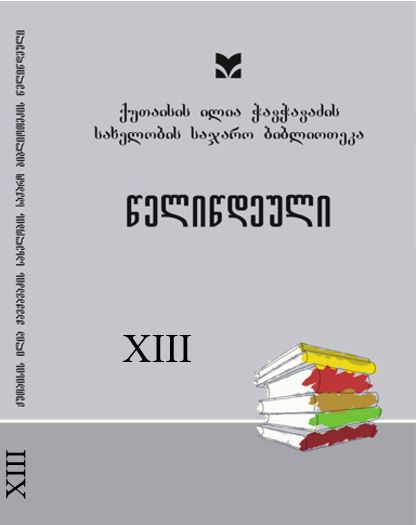Tekla Batonishvili (princess) and the beginning of the change of the historical-cultural paradigm in the conditions of the Russian colonial policy in Georgia
DOI:
https://doi.org/10.48614/yk.13.2021.92-98Keywords:
Cultural Orientation, Cultural Expansion, Ideas of EnlightenmentAbstract
The endless Iranian-Ottoman invasions shook the basics of Georgia’s political, economic, and cultural foundations. Persian cultural expansion was especially noticeable in aristocratic circles and endangered the Georgian national thought, for which Western values had been defined since the Middle Ages, as Georgian culture had followed the path of Western development since preChristian times. In the XVII-XVIII centuries, the expansion of Persian culture was observed especially in literature and music and created an obvious danger for the degeneration of Georgian national thought. It was in this situation that Erekle II promoted Anton the Catholicos to the royal court, with the help of which appeared the main line against the expansion of Eastern culture and the pursuit of European culture, in which the Russian Empire was to play an important role.
Striving for Russia and giving preference to Russian orientation was not an easy political move. However, Georgian thinkers believed that this would be the best way for Georgia to get closer to Europe and European culture, that it would be an opportunity to separate from Eastern cultural traditions, the final definition of Georgia’s general cultural orientation.
Capitalist relations were slowly being established in the country, the Georgian bourgeoisie was formed, but Russia’s colonial policy prevented Georgia from gaining a foothold in the ongoing processes in Europe. The Georgian people were in real danger of degeneration and extinction. Tekla Batonishvili and the advanced Georgian society correctly assessed the created threat and unleashed the national liberation movement in order to preserve their identity. Tekla Batonishvili shared the goals and action plans of the members of the Georgian National Liberation Movement, moreover, her son, Alexander Orbeliani, was one of the organizers of the 1832 conspiracy.
Colonial ideology had a devastating effect on most of the Georgian nobility, who replaced the vital interests of the country with the colonial yoke. But the national spark still lived on in the advanced sections of society. Through their way of life, beliefs, and literary or publicist works, they tried to bring the ideas of enlightenment and European culture to Georgia, which later laid the foundation for a powerful movement of „Tergdaleuli“, a struggle to raise the national self– awareness and self-consciousness of the country.




